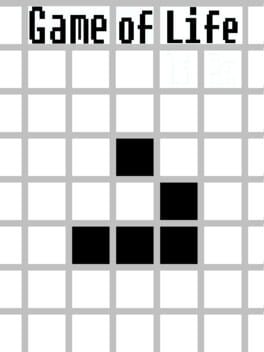Es más interesante desde el punto de vista matemático/computacional que otra cosa. Un juego no es, eso está claro, pero me parece increíble que en 2009, 39 años después de haberse creado, aún hubiera gente creando nuevas movidas. Curioso como poco.
PD: Al no ser un juego, tampoco creo que deba ponerle nota.
PD: Al no ser un juego, tampoco creo que deba ponerle nota.
Half-Century Challenge Series: https://www.backloggd.com/u/C_F/list/half-century-challenge/
HCC #1 = Game of Life (1970)
Hello everyone, I'm happy to announce Mega and I are engaging in the site's first Half-Century Challenge! We are both playing 50 games spanning from 1970 to 2020 and reviewing each one as we go along. Look forward to the series as a whole!
So, let's talk about Game of Life. This is not a 1 player game but a 0 player game, meaning it is played without any input from the player and merely observed. This game led the way to all sorts of 0 player games in the future such as Progress Quest, Godville, and, hell, CPU VS CPU matches in fighting games or whatever the hell. Essentially, the game is determined by RNG seeds before it even begins.
It looks like a simple game where some squares can live and die. But there is so much more to it. The abstract shapes function as a sort of Rorschach test, and I think that's kinda incredible for something from 1970. Gliders, spacers, pulse stars, etc are all potentially viewable from inside the grid.
https://upload.wikimedia.org/wikipedia/commons/e/e5/Gospers_glider_gun.gif
https://en.wikipedia.org/wiki/Conway%27s_Game_of_Life#/media/File:Game_of_life_pulsar.gif
https://upload.wikimedia.org/wikipedia/commons/4/4f/Animated_Hwss.gif
It's pretty telling that new patterns were being discovered for decades after its release, to say nothing of the countless times it has been recreated. It is directly homaged in various future games for good reason. Google "Game of Life" and thank me later.
Overall, Game of Life probably isn't something the player will be spending hours on. However, to quote John Apollo 11, it was one small step for a game, one giant leap for gaming. The term video game has sorta outgrown its origins. In the 70s, experiences like electronic versions of Pong were all the rage. The term "video game" is only so ubiquitous now since the medium harkened forth the image of games like Pong being recreated on a screen.
The fact Game of Life continues to be a cultural landmark, to say nothing of the fact it simulated something the players could never hope to recreate in real life with something along the lines of a ball and paddle? If that doesn't scream the medium was always a unique form of art, I'm not sure what does.
Next time: The Oregon Trail (1971)
HCC #1 = Game of Life (1970)
Hello everyone, I'm happy to announce Mega and I are engaging in the site's first Half-Century Challenge! We are both playing 50 games spanning from 1970 to 2020 and reviewing each one as we go along. Look forward to the series as a whole!
So, let's talk about Game of Life. This is not a 1 player game but a 0 player game, meaning it is played without any input from the player and merely observed. This game led the way to all sorts of 0 player games in the future such as Progress Quest, Godville, and, hell, CPU VS CPU matches in fighting games or whatever the hell. Essentially, the game is determined by RNG seeds before it even begins.
It looks like a simple game where some squares can live and die. But there is so much more to it. The abstract shapes function as a sort of Rorschach test, and I think that's kinda incredible for something from 1970. Gliders, spacers, pulse stars, etc are all potentially viewable from inside the grid.
https://upload.wikimedia.org/wikipedia/commons/e/e5/Gospers_glider_gun.gif
https://en.wikipedia.org/wiki/Conway%27s_Game_of_Life#/media/File:Game_of_life_pulsar.gif
https://upload.wikimedia.org/wikipedia/commons/4/4f/Animated_Hwss.gif
It's pretty telling that new patterns were being discovered for decades after its release, to say nothing of the countless times it has been recreated. It is directly homaged in various future games for good reason. Google "Game of Life" and thank me later.
Overall, Game of Life probably isn't something the player will be spending hours on. However, to quote John Apollo 11, it was one small step for a game, one giant leap for gaming. The term video game has sorta outgrown its origins. In the 70s, experiences like electronic versions of Pong were all the rage. The term "video game" is only so ubiquitous now since the medium harkened forth the image of games like Pong being recreated on a screen.
The fact Game of Life continues to be a cultural landmark, to say nothing of the fact it simulated something the players could never hope to recreate in real life with something along the lines of a ball and paddle? If that doesn't scream the medium was always a unique form of art, I'm not sure what does.
Next time: The Oregon Trail (1971)
Não é um jogo, todo mundo já está cansado de saber que não é um jogo. Mas não deixa de ser um software divertidíssimo de se brincar e fuçar, e no decorrer dos anos criou-se uma verdadeiro comunidade ao redor desse brinquedo digital/simulação matemática/coisa com seu próprio léxico e descobertas cada vez mais complexas e fascinantes. Recomendo especialmente esse site aqui, que tem um bocado de recursos e permite você testar alguns dos padrões mais "famosos" (dentro desse nicho, claro) facilmente. Ou, se você quiser uma verdadeira experiência oldschool, pode transcrever e compilar a popular versão em BASIC num terminal da vida, como se fazia nos tempos das cavernas.
